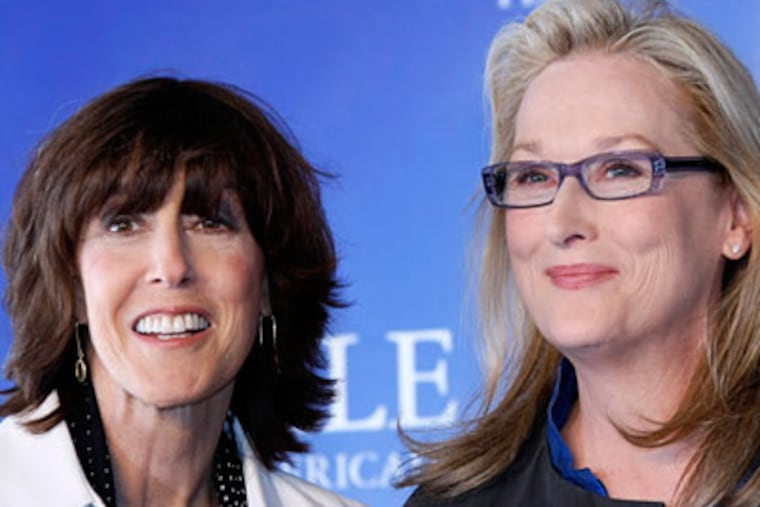Goodbye, Nora Ephron
"I'LL HAVE what she's having." That line is one of the most iconic in film history, and it's delivered in "When Harry Met Sally," right after Meg Ryan's Sally demonstrates that, yes, women do, in fact, fake orgasms. It's spoken by director Rob Reiner's mother, Estelle, and it was written by Nora Ephron, who passed away on Tuesday from acute myeloid leukemia.

"I'LL HAVE what she's having."
That line is one of the most iconic in film history, and it's delivered in "When Harry Met Sally," right after Meg Ryan's Sally demonstrates that, yes, women do, in fact, fake orgasms. It's spoken by director Rob Reiner's mother, Estelle, and it was written by Nora Ephron, who passed away on Tuesday from acute myeloid leukemia.
Pound for pound, "When Harry Met Sally" is one of the best romantic comedies of all time, complete with a meet-cute, a will-they-or-won't-they and an epic speech at end as Billy Crystal's Harry declares his love for his best friend, Sally (Ryan). But Estelle's line — really, Ephron's writing — is what people remember.
Ephron, who directed "Sleepless in Seattle," "This is My Life" and "You've Got Mail," put the kind of women on screen who rarely have a place in current romantic comedies, a genre Ephron defined during her heyday. They're sexual women who aren't idiots, but most importantly, their sole purpose never revolved around finding the right man. As much as she understood the complexities of romantic love, Ephron placed a premium on female friendship and camaraderie. Where would Ryan's Sally be without her confidante Marie, played by Carrie Fisher? The love story at the heart of "Julie and Julia" was not between Meryl Streep's Julia Child and her husband (played perfectly by Stanley Tucci), but found in the cross-generational admiration between Child and the utterly lost Julie (Amy Adams).
No one will argue that Ephron was the greatest filmmaker. She wasn't. Her films are light and often rote. The guy always got the girl; the audience always left the theater feeling warm and fuzzy.
But those films overshadowed something more fundamental about Ephron: She was a fantastic writer. She initially came to prominence as a magazine writer, penning a column for Esquire about women. Her piece, A Few Words about Breasts, is must-read for anyone who has them — or likes them — as are her collections "Crazy Salad," "Wallflower at the Orgy" and "I Feel Bad About My Neck."
Ephron's first success in film came from writing the decidedly serious screenplay for "Silkwood," for which she received an Academy Award nomination. Yet the rhythms and themes that we associate with her films today first became apparent in "Heartburn," a movie based on the eponymous, semiautobiographical novel about her failed marriage to journalist Carl Bernstein. "Heartburn," starring frequent collaborator Meryl Streep as Ephron's surrogate, isn't worth watching. It never really goes anywhere, and the divorce was still too raw for Ephron's trademark wit to shine through the darkness that lurked behind much of her work. But "Heartburn" showed Ephron transforming her pain into art, taking control. It's something one of her characters would have done. And something that female characters in movies from here on out could learn from.